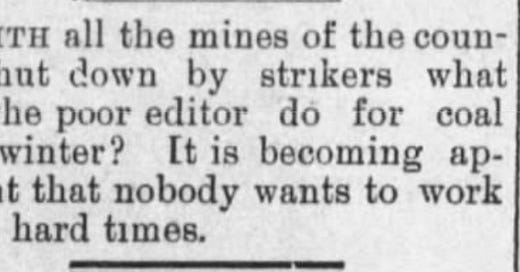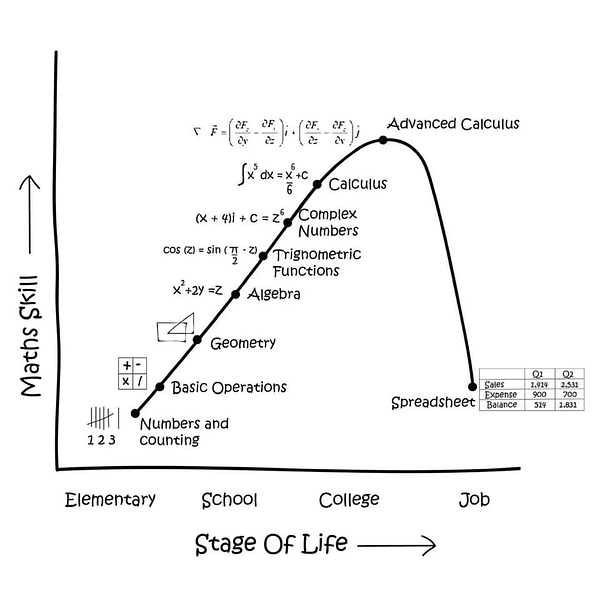July 23rd, 2022: Greetings from Connecticut! I spent this week upgrading my consulting skills course for a cohort I’m kicking off for a company next week. I’ve been doing a lot of virtual trainings with small consulting firms and data-driven corporate teams on structured thinking, communication, and presentation and storytelling skills and have learned a ton about teaching virtually. It should be fun to integrate all of this into my 4th corporate cohort.
I sold about 68 audiobooks in the first week. If you haven’t gotten it already, you can buy it on Audible, Amazon, or Itunes.
I published a podcast episode with John Paller who founded the worker’s cooperative Opolis. We talked about healthcare in the indie economy and how web3 might play a role in that. You can listen here.
If you’d like to sponsor this newsletter or the podcast, you can do that here.
#1 Money & Sustaining The Journey
Nat Eliason had a great essay on the balance of making money versus doing what you really want to do while being self-employed.
It took a while for me to realize that all of this other work was originally just to support being able to write. I started making courses to support writing. I started the agency to be able to write. I went into crypto because I was scared of not making enough money writing.
I’ve written about how at the end of 2020 I decided to write a book after asking myself “what would you do with more money?”
Financially it was probably not the right choice, as the opportunity in online courses was big, but in terms of giving me the energy to keep going on the path, I’d do it 100 times out of 100 again.
When I quit my job, one of my fears was creating a job-like container for myself again. A bunch of stuff I felt like I had to do but didn’t want to do. This nudged me to take a slower approach to everything. I previously called this the “long, slow, stupid, fun” way:
Long: Focus on the meta-game of finding the work I want to keep doing indefinitely. Don’t get distracted by shiny objects.
Slow: Do things slowly. Start small and level up over time.
Stupid: Lean against obvious ways to make more money when you sense it’s not the thing that will matter over the long run.
Fun: Am I still having fun? Keep going. If not, quit, optimize, or scale back.
The obvious reason for taking this approach was to avoid burning out. On that front, I’ve done pretty well. There’s probably only one or two months over the past five years when I was doing work I didn’t really want to be doing at all.
The less obvious reason is that it forced me to be suspicious of anything that generated money. I had a sense that making money was not the most important thing on my path and that it might hack my brain in ways that would undermine staying on this path over the long term.
This was probably a smart decision. If I had doubled down on the things that were making me money early on I would have spent a lot of time working on things that didn’t have much potential and it would have distracted me from exploring and creating space in my life - the things which really do seem to lead to better ideas and opportunities.
But this is damn hard. One weird thing about my life is that I definitely don’t know how much money I’ll be making a year from now and I can’t really tell how much I’m making now either.
In the face of uncertainty its sensible to talk yourself into what Nat did:
But at some point I forgot that. I went past the number I needed to justify putting money back on cruise control, and kept accumulating more and more. I got hooked on it.
This is part of why I like taking every seventh week off. It allows me to step back and reflect on those previous six weeks and ask “did I really want to work on that stuff over the past six weeks, or am I deluding myself in some way?”
Which is not to say I’ve got everything figured out.
I recently took a short consulting engagement where I’ll be working 1-2 days per week for a month-long project. It’s short enough of a test that I can see if that kind of work is something I might want to lean back into. It is well paid and that is the core of the issue Nat talks about. Do I really need to do this? Or is it serving the subtle insecurity of running out of money that almost everyone seems to face?
In 2022 I’ve had more opportunities than I’ve ever had and this will be my best year financially by far. I also sense a recession might be coming and have been trying to build cash to weather the storm if it comes. Yet another part of me wonders, just like Nat, whether I’m just delaying committing in a deeper way to things like my writing.
Nat’s newsletter is very good and if you like my writing you’ll like his. Check it out:
#2 “Mindset Inequality”
I thought this reflection on what hte author Ricky Yean called “mindset inequality” was very good. Ricky writes about how growing up in poverty impacted how he showed up in the world:
My mom, who didn’t go to college, used to say this to me, and it bothered me a lot. She’d say, “We’re not meant to be successful, so what you’ve achieved is good enough!” Compare that level of confidence to a kid with successful parents who’d say something along the lines of “If you can believe it, you can achieve it!” Now imagine walking into a VC office having to compete with that kid. He’s so convinced that he’s going to change the world, and that’s going to show in his pitch. You can’t just muster up that confidence on the spot.
And then even if you break through, there is the guilt:
Finally, there’s the constant guilt. If you have a Stanford degree and share my background, you’re likely the only one they can count on at home. You most likely would have the opportunity to work at safer and more lucrative careers that would be of more immediate help to your family. It’s very irresponsible to pursue the startup path, and even if you do succeed in upgrading your mind software to get rid of all the bugs I mentioned above, you start to sound and act differently from the people you grew up with. You might even get accused of losing your identity.
One thing I’ve learned from talking to hundreds of people about work and taking unconventional paths is that the biggest fears are always related to identity.
I grew up around people that built lives around full-time jobs at big companies. This was the smart thing to do. So when I walked away, I wasn’t just making a bet on a different future, I was abandoning the patterns of what people around me saw as the right path in life. After talking about my path excitedly in the first year and getting challenges, I learned the lesson to stay small and not talk much about it.
It’s always interesting to see people who get money from their parents or have active mentorship of the people around them to pursue alternative paths. Ricky actually decided to write his essay after seeing the following observation from Paul Graham:
“Closely related to poverty is lack of social mobility. I’ve seen this myself: you don’t have to grow up rich or even upper middle class to get rich as a startup founder, but few successful founders grew up desperately poor.”
One current interest I’m exploring is how families with wealth think about the role of work in one’s life. The reason it’s interesting is that because it shows you what a mini-culture looks like when yearly income is not the direct and obvious goal.
From a few interesting examples I’ve seen, the last thing on earth these kinds of families push their kids toward is a stable, full-time job. Ownership, life skills, and autonomy seem to be much more important. While she did not come from this kind of family, the interview I did with Hannah Frankman and her experience being homeschooled was an amazing example of what it looks like to optimize around different aims in the modern world.
#3 Relative Learning vs. Absolute Learning
Freddie deBoer has a long exploration of the ultimate challenge of all attempts to improve schooling: absolute learning seems to increase over time but relative learning gaps never seem to close:
So too with academics: the fact that growth in absolute learning is common does not undermine the observation that some learners will always outperform others in relative terms. Everybody can learn. The trouble is that people think that they care most about this absolute learning when what they actually care about, and what the system cares about, is relative learning - performance in a spectrum or hierarchy of ability that shows skills in comparison to those of other people.
Here’s the full essay (30 min read)
#4 No One Wants to Work!
Just like complaining about younger generations, people love to whine about people not working. Here is a newspaper clipping from 1894:
And a full thread of more examples over the past 125+ years:
#5 Viral Tweet
I had a crazy viral tweet that had like 6 million impressions and led to like 700 more followers and an estimated 20-30 book sales. It was a chart that cracked me up mostly because it mapped well to my life:
Thanks For Reading
I am focused on building a life around exploring ideas, connecting and helping people, and writing. If you’d like to support my journey, the best ways are to:
Buy or listen to my book, The Pathless Path
Purchase one of my courses on freelancing or reinventing your path
In addition, I recommend all of the following services (affiliate links).
Kevin Shen’s Dream Studio Cohort-Based Course (or custom studio builds)
Podia - 14-day free trial (read my review here)
Teachable - 14-day free trial
Skystra - Fast WordPress Hosting
Circle - 14-day free trial
Alternatively, if you want to support this newsletter through a micro-donation, you can do so here:
A reminder: I don’t check unsubscribe alerts and never look at my subscriber list. So if you feel like unsubscribing, you can do so below.











Really enjoyed this, thanks Paul. Related hard to the mindset inequality segment. Still debugging the risk aversion in me. The maths skills map is hilarious.
> One thing I’ve learned from talking to hundreds of people about work and taking unconventional paths is that the biggest fears are always related to identity.
I just discovered a person named Aella on Twitter and Substack yesterday. She has a GREAT essay called “decoding the elites” or something similar about her experience being from a working class background and mingling at high end elite parties. It’s an excellent essay generally and it’s really insightful if you’re interested in that clash of worlds.